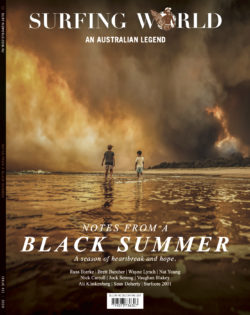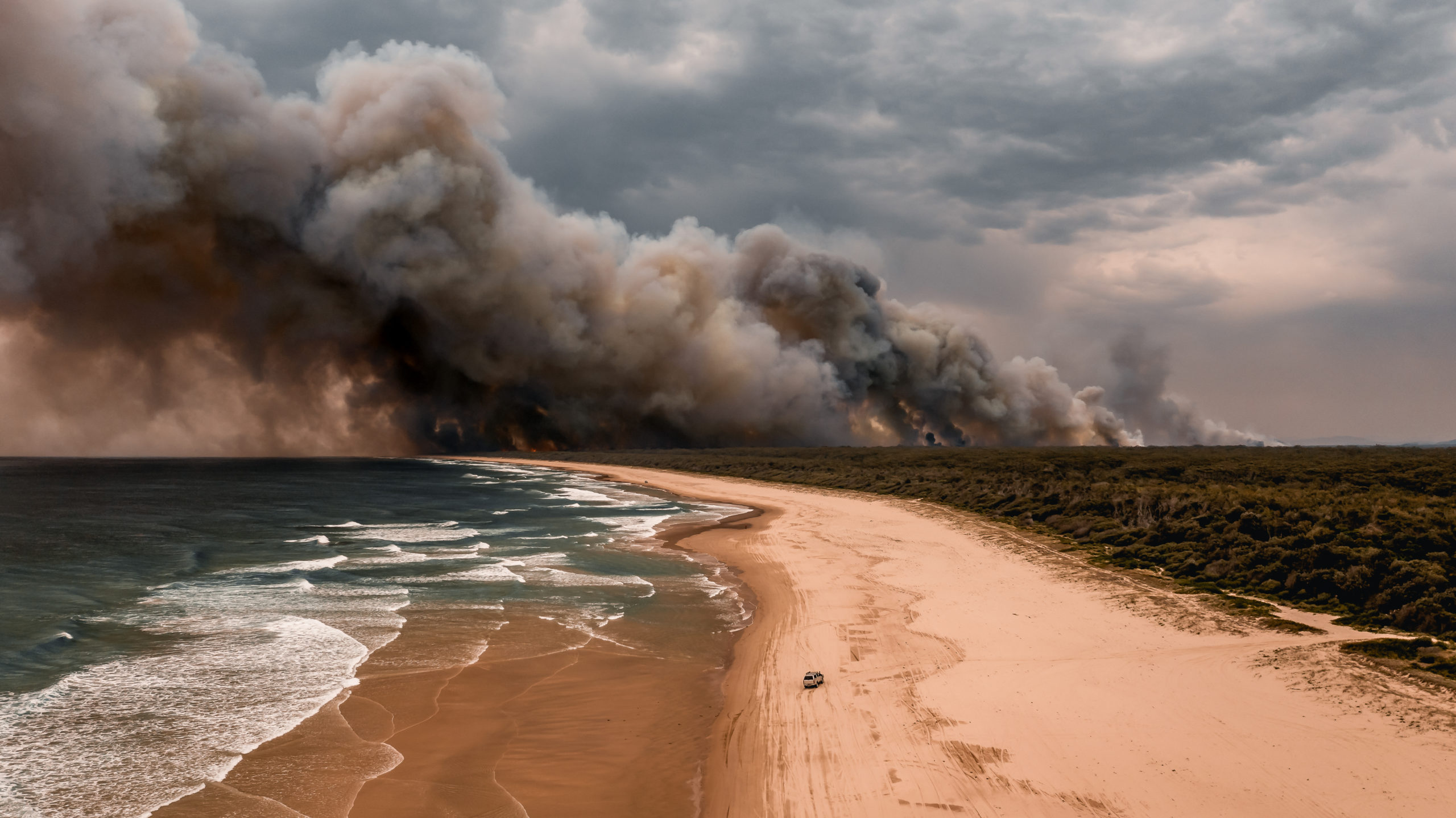WAYNE LYNCH ON THE BLACK SUMMER
In 1983, Wayne Lynch lost his family property at Urquhart’s Bluff in the Ash Wednesday bushfires. The only thing he salvaged was a long, snaking piece of aluminium that had once been his tinny. Wayne knows fire, and found himself facing it yet again, this time on his rainforest property under the Koonyum Range, outside of Mullumbimby.

“I mean, the ground, the earth itself was the driest I’d seen it by far. To keep it in perspective I’ve only been here five years, but even the grass wasn’t growing like it normally would at that time of year. So yes, I could tell things were serious. And my permaculture orchard which had as a ground cover sweet potato had completely died off, every skerrick of it. I lost probably a third of the plants, and that whole orchard was planted in an area where water moves through the property underground. The idea with putting it there was its watering the garden, but it was also to slow down – in a really heavy rain – the way the water ran across the surface, leaching the minerals out of the soil. All that was gone completely. The bush was under incredible stress; the way the trees were holding their leaves, it was… it was spooky. It was an odd thing to witness. You can just see that they were all very stressed. This is rainforest. There’d been a few fires I’d taken notice of that had burnt rainforest. I thought rainforest wouldn’t burn very hot; I wasn’t even sure it would burn at all. But in certain places a bit further south it was. So I knew this is pretty serious.”
“I got burnt out in Ash Wednesday in Victoria. So I’ve been through it – well and truly through it – and I’m really aware of it. I’m aware of everything. I look at smoke, every time it rises anywhere I’m thinking, what’s going on there. I need to keep an eye on it. When you’ve got such dry conditions and you’re getting all these lightning storms coming through, dry storms, you’re getting fires everywhere being started through lightning. I just went, oh my God, you know, this is going to be serious. So yes, I was aware of the potential and when that fire started out the back here, it burned for a month here just behind us, two valleys over. They couldn’t put it out. Obviously they had fires everywhere else where the water bombers were deployed because they were more serious fires. But this fire just went around in circles with the wind changes. Then when things got really dry and the wind started to get really strong it flared right up.”
“We were right on the edge of it. The wind had been northeast like it had all summer, and it was keeping the fire away from us but then it swung NNW, even a little bit west at times. It was also hot and dry like Victoria but the fire blew down the valleys past us. But what happened was – and I knew this was gonna happen – there was a southerly change predicted, which is exactly what happened on Ash Wednesday to us. We packed up, cleaned out the workshop. Anything we thought was of value in the house took it to friends’ places all over the joint. We started to get cinders landing, but because we keep the place so well mowed nothing caught on. I didn’t have to put any fires out. There were no spot fires but it was hot I knew it was only a matter of time.”
“It was kinda spooky. Everyone had been evacuated on both sides of the valley. I knew it wasn’t too dangerous at that point, but I didn’t want my family to even get close to being in trouble. It was still okay but then that night the southerly change came through and that was the night. The next morning we may have been real trouble. What happened next was amazing. I kept getting up that night and looking out and checking the whole thing and going, yeah it’s pretty serious. But this country is so rugged, the valleys are so deep and you have such, sheer cliffs that when the change came through… okay, it was dodgy, but as soon as daylight came and the day came on a bit, it sucked the southerly into a southeast direction up here. So it actually sucked the fire back on itself. And then when the wind actually did go southeast, we were right. We were saved at the last minute.”
“I was anxious, but I wasn’t freaking out. In fact, anything but. I think everyone else around here was more anxious than us because they hadn’t lived through it before. They’re not used to fire up here. I grew up in Lorne and have been through four or five big fires in my life. Fires right to the doorstep and burning a lot hotter than most of them burned up this way. I wouldn’t say that about the fires down south further – you know, the Grafton and Nymboida fires sounded really hot and those fires were terrible. But I’m used to big walls of fire coming through like a front, you know, in one big line and just consuming everything in its path. Whereas up here, because it’s rainforest and it’s rugged, the fire was not in that structure. It was more in pockets, and even though it was coming at us pretty full-on it just still didn’t have that same characteristic. It didn’t move as fast. In Victoria in 10 minutes a fire would move kilometres and it would just spot in front of itself and explode into flame, whereas here, it was moving a lot more sedately, if that’s the word. But certainly, you know, the experience of Ash Wednesday helped me personally, having been through it before.”
“Well, for what it’s worth, the climatologists have been predicting for a long time exactly what happened. I’ve seen droughts. We all have. We live in Australia, but the length and severity of that drought and the intensity of the heat, even the local people up here who been here for generations – three, four, five generations – said they’ve never seen it is so dry and the heat so intense. So I think that speaks volumes. In the big picture, I think it’s pretty obvious what’s going on. Something has shifted. This is exactly what they were saying would happen. The weather will slowly become more erratic and more intense. You’ll get periods where it’ll look all right, but then suddenly there’ll be intense floods, or the drought will be more intense, or the fires more intense. And unfortunately we have governments that just deny it and won’t even study it. That’s what surprises me, that they actually refuse to acknowledge it. They won’t listen to the people who are actually there to inform them. And that’s the nature of what we’ve got going on in this country.”
“The opposition to what’s happening is always based on emotion. It’s not based on fact. Everyone who doesn’t want to agree with the science is coming up with emotional or personal opinions. None of it is based on fact. And those opinions are very emotional and very derogatory most of the time. I can’t believe the way that people who are just trying to help are being personally slandered or attacked. That really it bothers me. It’s not the way to have a conversation. I mean, it’s happened to me in my life over many years. Many times over many things. And you would hope now that we could have some civility and a discussion of real facts to look at what’s going on and go, what do we do? But unfortunately the people who support the facts are coming under personal attack. It’s meant to somehow either disqualify the science or try and paint these people as loonies or something, that it’s all heresy. You look back to when Galileo worked out that the earth revolved around the sun and not the other way around, he was under house arrest for nine years!”
“Europe’s a lot more aware and in England, even Boris Johnson of all people is not denying climate change. He’s talking about it and their power grid is over 50% renewable energy and he’s quite pleased with it. So it just shows you; you don’t have to take that stance on that side of politics. It intrigues me. I don’t understand it. I mean, I look at it and go, are they that cynical? There are people on that side of politics with educations and they must know. Some of them at least must know it’s true. Do they just ignore it because they don’t want to know it’s true. I’m bewildered.”
“I’m not optimistic, but I’m hopeful. I think, I just think if we don’t change soon, it’s too late and whatever the consequences of that, the younger generations and future generations are going to have to cop it sweet and live with it and do the best they can. I’m hopeful there will be change. I’m hopeful there will be enough clear evidence in just the way the climate is functioning and enough people will go, hey, this is true. This is happening. We need to investigate this and inform ourselves and inform each other and then vote governments out who won’t move forward with the obvious changes needed. I have to stick with that hope, otherwise it would be overly depressing and it can be depressing enough.” [Laughs]
